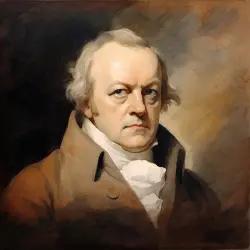William Blake was born in Soho, London, England in November of 1757. After leaving school at the age of ten, and falling under the tutelage of his mother, Blake claimed to have had the first of his famous angelic vision. It was an experience that would become a reoccurring theme in his life.
As he aged, he developed a love for drawing, painting, engraving and writing. Some training in his youth helped prepare him for his later artistic endeavors. In 1782 he was married and during the following years he published his collection Poetical Sketches. After his brother died, Blake claimed he came to him in a vision, inspiring him to create an original printing method for his artwork, known as “illuminated printing”. Blake utilized this technique in his best-known collection Songs of Innocence and Experience.







